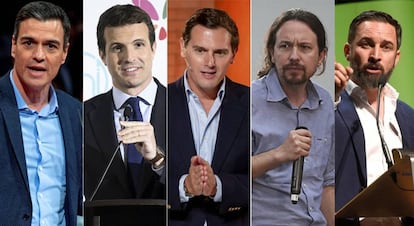Spain’s election officials suspend TV debate with far-right party Vox
Its presence would violate rules on minimum congressional representation; PM Pedro Sánchez says he will instead attend a four-candidate event on public broadcaster TVE

Spanish election officials have suspended a five-candidate televised debate planned for next Tuesday that would have included the far-right party Vox.
The decision comes after three regional parties from Catalonia, Basque Country and the Canary Islands complained that they were being left out.
It is absurd to veto candidates at private network debates
Podemos leader Pablo Iglesias
According to legislative reforms introduced in 2011, private networks have the obligation to respect the same principles of “neutrality and equality” as public stations. At that time, the Central Electoral Board (JEC) established that only parties that had earned at least five percent of votes at the last general election could participate in these debates.
Vox obtained 0.2% of the vote at the 2016 election, significantly shy of the threshold. Election officials said its presence would violate the rights of Catalan and Basque nationalist parties, whose leaders were not invited to the event.
The JEC told the Atresmedia group, which owns Antena 3 and La Sexta, to come up with an alternative format for the program. Atresmedia offered a new four-way debate on the same date, April 23 at 10pm.
But Prime Minister Pedro Sánchez on Wednesday announced that he will instead attend a four-candidate debate on the state broadcaster TVE, scheduled for the same day. The Socialist Party (PSOE) has finally opted for the public television over the private network, saying that “it has offered the signal for free to all media wishing to air the debate,” and because it was the first to offer a four-candidate debate. Before the JEC’s decision, Sánchez had originally opted for Atresmedia over TVE.
Reaction
The new event will leave out Vox leader Santiago Abascal, and instead focus on representatives from the governing PSOE, the conservative Popular Party (PP), the center-right Ciudadanos (Citizens) and the leftist Podemos.
Distance voting
Spaniards living abroad will have a minimal impact on the general election of April 28. Barely 8.4% of the approximately two million nationals who live outside Spain have applied for distance voting, according to the National Statistics Institute (INE). This is largely due to the failure of a legal reform that attempted to make voting easier. Since 2011, would-be voters need to apply and send in their ballots within a very tight timeframe, a hurdle that has seen participation figures plummet in recent years.
Abascal, whose party put in a strong performance at the Andalusian election last December and now props up a center-right government there, talked about “unfair treatment.”
“It’s been demonstrated that separatists are in charge in Spain. Junqueras can go to the debates but we cannot,” he said, alluding to the secretary general of the Catalan Republican Left (ERC), Oriol Junqueras, who was recently allowed to give a news conference from prison. Junqueras remains in custody in connection with a rebellion trial involving the failed secession bid of 2017.
Podemos leader Pablo Iglesias said he feels “it is absurd to veto candidates at private network debates. We need to legislate now to make candidate debates mandatory.”
A controversial debate
Although Prime Minister Pedro Sánchez had agreed to it, the idea of letting Vox participate in a national debate had not been without its critics. Sources within the governing PSOE had expressed misgivings, while the PP had noted that giving Vox this kind of airtime could be a fatal mistake. “When the left conjures up monsters, the monsters end up devouring the left,” said one conservative source about Vox, which polls suggest could earn 10% on April 28.
In the meantime, the first significant debate of this campaign was held on Monday on the set of TVE, bringing together leaders from six political groups with a congressional presence: PP, PSOE, Unidas Podemos (an alliance of the anti-austerity party with greens and the United Left), Ciudadanos, the Catalan Republican Left (ERC) and the Basque Nationalist Party (PNV).
This early debate, held just hours after the JEC’s decision regarding April 23, pitted parties and blocs against each other through angry exchanges where the Catalan conflict featured prominently. There were also harsh words against PM Sánchez, who was variously described as “a person who is not decent” and “a public danger” by Cayetana Álvarez de Toledo of the PP and Inés Arrimadas of Ciudadanos.
English version by Susana Urra.
Tu suscripción se está usando en otro dispositivo
¿Quieres añadir otro usuario a tu suscripción?
Si continúas leyendo en este dispositivo, no se podrá leer en el otro.
FlechaTu suscripción se está usando en otro dispositivo y solo puedes acceder a EL PAÍS desde un dispositivo a la vez.
Si quieres compartir tu cuenta, cambia tu suscripción a la modalidad Premium, así podrás añadir otro usuario. Cada uno accederá con su propia cuenta de email, lo que os permitirá personalizar vuestra experiencia en EL PAÍS.
¿Tienes una suscripción de empresa? Accede aquí para contratar más cuentas.
En el caso de no saber quién está usando tu cuenta, te recomendamos cambiar tu contraseña aquí.
Si decides continuar compartiendo tu cuenta, este mensaje se mostrará en tu dispositivo y en el de la otra persona que está usando tu cuenta de forma indefinida, afectando a tu experiencia de lectura. Puedes consultar aquí los términos y condiciones de la suscripción digital.








































